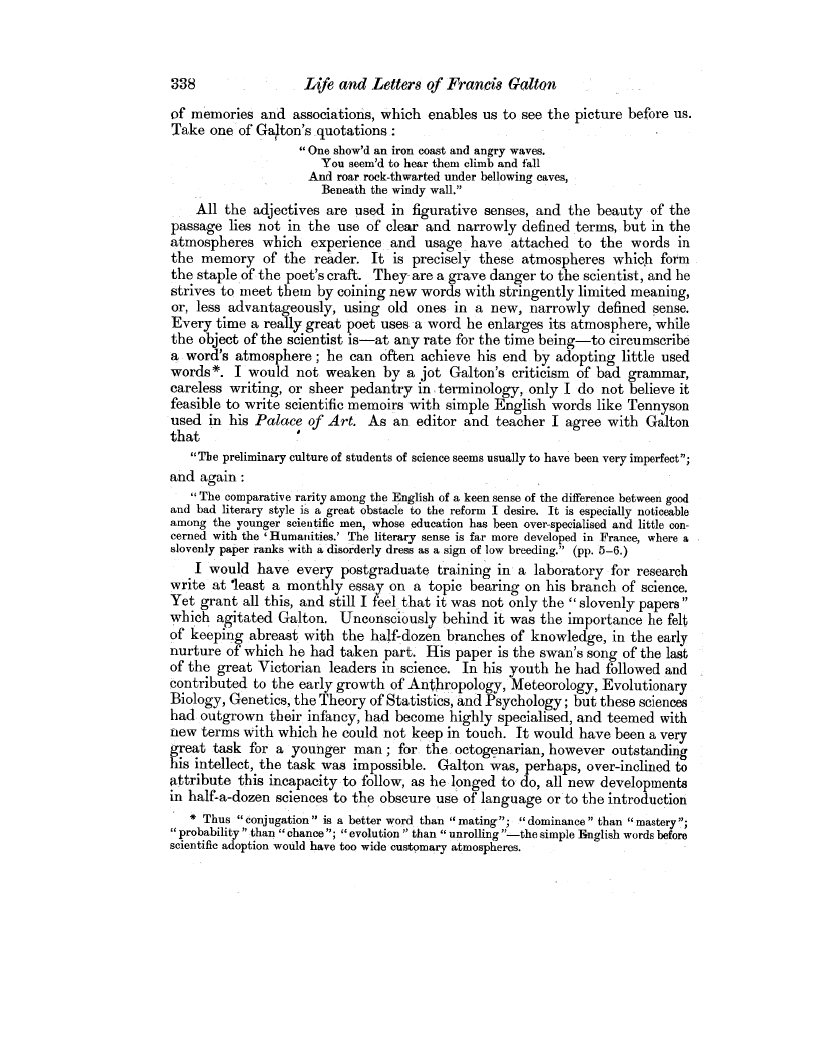| ||||||

OCR Rendition - approximate
338 Life and Letters of Francis Galton of memories and associations, which enables us to see the picture before us. Take one of Galton's quotations " One show'd an iron coast and angry waves. You seem'd to hear them climb and fall And roar rock-thwarted under bellowing caves, Beneath the windy wall." All the adjectives are used in figurative senses, and the beauty of the passage lies not in the use of clear and narrowly defined terms, but in the atmospheres which experience and usage have attached to the words in the memory of the reader. It is precisely these atmospheres which form the staple of the poet's craft. They area grave danger to the scientist, and he strives to meet them by coining new words with stringently limited meaning, or, less advantageously, using old ones in a new, narrowly defined sense. Every time a really great poet uses -a word he enlarges its atmosphere, while the object of the scientist is-at any rate for the time being-to circumscribe a word's atmosphere ; he can often achieve his end by adopting little used words*. I would not weaken by a jot Galton's criticism of bad grammar, careless writing, or sheer pedantry in. terminology, only I do not believe it feasible to write scientific memoirs with simple English words like Tennyson used in his Palace of Art. As an editor and teacher I agree with Galton that "The preliminary culture of students of science seems usually to have been very imperfect"; and again " The comparative rarity among the English of a keen sense of the difference between good and bad literary style is a great obstacle to the reform I desire. It is especially noticeable among the younger scientific men, whose education has been over-specialised and little con cerned with the `Humanities.' The literary sense is far more developed in France, where a slovenly paper ranks with a disorderly dress as a sign of low breeding." (pp. 5-6.) I would have every postgraduate training in a laboratory for research write at 'least a monthly essay on a topic bearing on his branch of science. Yet grant all this, and still I feel that it was not only the " slovenly papers " which agitated Galton. Unconsciously behind it was the importance he felt of keeping abreast with the half-dozen branches of knowledge, in the early nurture of which he had taken part. His paper is the swan's song of the last of the great Victorian leaders in science. In his youth he had followed and contributed to the early growth of Anthropology, Meteorology, Evolutionary Biology, Genetics, the Theory of Statistics, and Psychology; but these sciences had outgrown their infancy, had become highly specialised, and teemed with new terms with which he could not keep in touch. It would have been a very great task for a younger man ; for the. octogenarian, however outstanding his intellect, the task was impossible. Galton was, perhaps, over-inclined to attribute this incapacity to follow, as he longed to do, all new developments in half-a-dozen sciences to the obscure use of language or to the introduction * ,~ Thus "conjugation" is a better word than mating " dominance than « mastery_; "probability " than " chance' ; " evolution " than " unrolling "-the simple English words before scientific adoption would have too wide customary atmospheres.
|